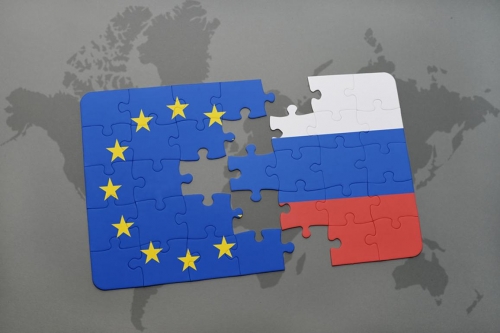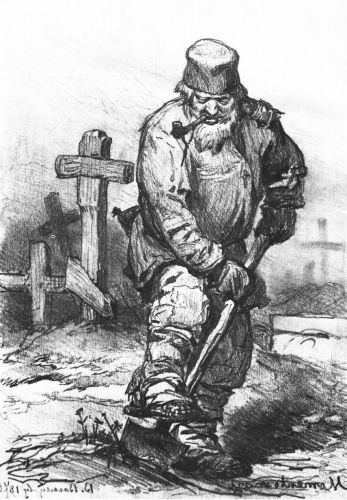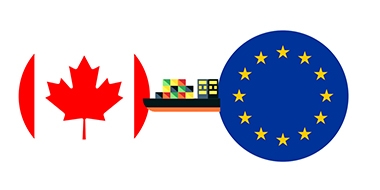Among those on the Right who address man’s relationship to the rest of the natural world, one finds a variety of approaches. There are the anthropocentric conservationists, who promote the “wise use” or prudent management of natural resources for future generations. There are the Social Darwinist varieties, who view humanity as a purely biological part of nature and subject to its harsh laws. And there are those of a more traditionalist bent who regard the natural as an expression of primordial cosmic order which demands our respect. I’ve taken to calling this third variant “integral ecology,” for this approach to ecology is inseparable from larger questions of metaphysics, human nature, ethics, and politics. [1] [1]
It is this third approach to environmental questions that I believe to be truest and the most consistent, and have promoted it as such in my various writings. However, since the connection between traditional metaphysics, the politics of the Right, and integral ecology may not be immediately clear, I will attempt to explain my understanding of it here. As I consider myself more of a Kshatriya than a Brahmin [2], I make no claims to originality or perfect exposition of the traditional doctrine. I nevertheless believe the outlines are correct and support the inclusion of an integral ecology into the outlook of the True Right.
My understanding of the primordial tradition is heavily influenced by the writings of Julius Evola and René Guénon. According to the traditionalist school, this ageless doctrine was expounded in the East by the teachers of Hinduism, Taoism, and early Buddhism. In the West, it was most thoroughly explicated by Plato and his Neoplatonist heirs, though its origins lie much further in the past, as the Greeks believed that their wisdom came from Egypt. Whether or not one believes in the truly nonhuman, primordial origins of this doctrine, it nevertheless reappears in human history in widely varying cultural settings and, with some thought and practice, can be seen to be the truest representation of reality as we know it.
I will begin by sketching an outline of traditional metaphysical doctrine, then explain why it forms a necessary foundation for Rightist political thought as well as integral ecology. I will conclude with a description of the present-day enemies of this doctrine — anti-traditional metaphysics, the political Left, and anthropocentric “environmentalism.”
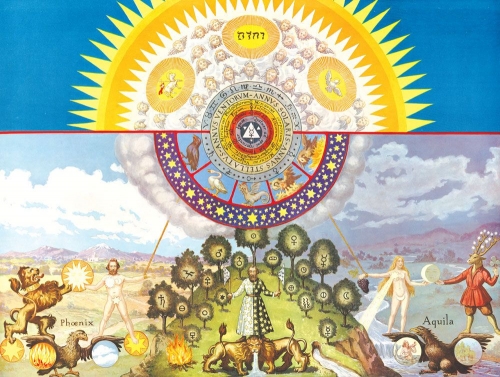
The Sophia perennis
Metaphysics is the science of first principles. It is the master science, upon which all others are grounded. The primordial tradition, its adherents say, originates in a teaching from the non-human. What this means is that its metaphysic is inherent in the fabric of the universe, existing separately from and prior to the human intellect, and offers a complete, perfect, and true understanding of reality.
According to traditional doctrine, man in his primordial state apprehended these truths directly. While humans have fallen away from their origins and lost their direct experience of the divine, this wisdom and mystic experience is still accessible to contemporary mankind through initiation, meditation, and ritual. These avenues to transcendence have been preserved in the great philosophical and religious doctrines of the ancient world, which despite their historical adaptations to different places and times offer a means of access to the same transcendent reality. This is the meaning of traditio, which connotes something that is transferred from one generation to another. Those of the traditionalist school called this the Sophia perennis, or perennial wisdom.
The various manifestations of the primordial tradition throughout history differ in some particulars. However, there are sufficient commonalities to sketch a shared metaphysical view. In the beginning is the divine ground, absolute Being, synonymous with reality itself, known variously as God, Brahman, the One, the Tao, the Absolute. This is the transcendent reality, the silence and stillness, the order beneath the chaos, the unity before the multiplicity. It contains all and transcends all. This is the ineffable, unknowable power at the center of the cosmos; whole, complete, containing every perfection. No description of mine could possibly do it justice, and the greatest poets and mystics can only offer us imperfect reflections of it.
While perfectly self-sufficient in Himself, God’s essence is overflowing. In order to fully realize the perfection of His nature, He creates the cosmos and its myriad beings. He creates and suffuses the basic matter of the universe with His spirit, and all things come to be in accordance with divine Forms that exist in His mind. All that exists, therefore, participates in the divine order.
Some forces and entities are more spiritual in nature while some are more wholly material. There is, consequently, a chain of Being in creation, descending from God to the angels to mankind and down to inanimate matter, but all things that exist are nevertheless touched with the divine. Thus, while the Gnostics and life-denying dualists of Manicheanism condemned matter as wholly evil and posited a stark dualism between matter and spirit, in traditional metaphysics, all that exists is in some sense divine — though certain entities possess divinity to greater or lesser degrees. Evil arises in a being that is deprived of this good, having forsaken the divine order in favor of its own self-will.
Traditional metaphysics is therefore panentheistic [3], meaning it conceives of God as containing and suffusing all of existence while at the same time transcending it. This differs from pantheism, which simply asserts that “the world is God,” in that it acknowledges a dimension to God’s existence that transcends the material world. Thus, while pantheism lends itself to relativism (since all things are equally “of God” and in some sense indistinguishable), the traditional conception permits the existence of distinct entities and allows one to distinguish which are more or less in alignment with the divine nature.

Additionally, traditional metaphysics differs from classical theism in denying a strict Creature-Creator distinction. In one sense it is monist [4], in that all things are ultimately manifestations of the transcendent being and therefore lack an independent reality. However, it is also emanationist [5], regarding existence as an emanation or descent of the divine into matter. Thus, while a divide necessarily exists between God and man, it is possible for man through purification and meditation to obtain a mystical experience of God that would be impossible if a strict dualism existed.
While the teaching of the primordial tradition is eternal, it has manifested itself in human history in different ways depending upon cultural, racial, and historical factors. I will focus principally on the West. Though many on the Right (including Evola himself) reject Christianity for a variety of quite understandable reasons, Christianity has been, for better or for worse, the primary vehicle of traditional metaphysics in the Western world for the last two thousand years, and bears some discussion in this respect. [2] [6]
While many strains of Christian thought have strongly emphasized the creation ex nihilo and the Creature-Creator distinction, and thus maintained a strict dualism, this is neither the only school of thought nor the historically dominant one. Theologians particularly influenced by Greek thought and the Eastern Fathers have typically propounded a conception of God more in accord with the traditional metaphysics of the classical world: these include St. Augustine, Pseudo-Dionysius, Meister Eckhart, Nicholas of Cusa, Dante, and Jakob Boehme. These thinkers certainly believed in the God of the Bible, but in endeavoring to penetrate the mystery of His existence they looked to Greek philosophy in addition to scriptures. This is no contradiction, as prior to the Reformation Christians generally believed that revelation could be found in “the book of nature” and attempted to synthesize Christian thought with the truths learned by the classical world. They differed from the Greeks in regarding man as a fallen being, ensnared by sin and thus temporarily divorced from the divine. However, God gave mankind his Son, who would serve as a Savior, an exemplar, and a bridge between God and Man, rebuilding the path to transcendence and mystical experience that had been broken by Adam’s disobedience. Thus, through purification, asceticism, and prayer it would be possible for man to attain some insight into the supreme mystery. In contrast to the somewhat colder Neoplatonism of the ancient world, the Christian God was a God of love. The highest exemplar of this all-encompassing love or agape in the history of the Church, after Christ himself, was St. Francis, whose love extended to the birds and wolves and sun. This lent a unique dimension to the Christian tradition that likely made it highly appealing to the dynamic Faustian soul of Europe.
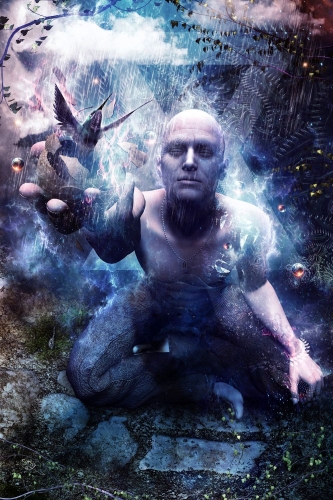
This esoteric tradition in Christianity existed alongside the more literal and ritualistic exoteric tradition for hundreds of years. In theory, no conflict exists between them. However, as the Church grew more and more ossified and suspicious of anything that reeked of heresy, particularly after the Protestant Reformation, certain aspects of the tradition were driven underground, surviving in movements such as Hermeticism and Rosicrucianism. While the contemporary Church as a whole appears to be greatly divorced from its origins, it nevertheless remains the last intact and unbroken vessel of the primordial tradition in the West, and whatever the flaws of the Curia or its clerics, the doctrine and ritual remain sound.
Echoes of the primordial tradition can also be found in the Romantic and German Idealist thinkers who rejected Enlightenment materialism and returned to a more organic and spiritual conception of the cosmos. This pagan, Romantic, Nietzschean, Heideggerean approach may well be the most agreeable to readers who disdain Christianity. While more explicitly world-affirming, Romanticism was highly influenced by Neoplatonism and much of its art concerns the divine in man and nature. German Idealism, particularly the philosophy of Fichte, Schelling, and Hegel, regarded nature and human history as the process of self-revealing by the Absolute, and considered mankind as the Absolute reflecting upon itself. Even in the later Heidegger, we find a spiritualized and mystical conception of Being as the absolute ground of existence which reveals itself to mankind. There are obvious differences in exposition and emphasis, but continuity exists.
Put most simply, the essence of the primordial tradition is the reality of the spirit and the possibility of transcendence. All of these traditions and philosophies offer, in languages and concepts adapted to different cultures and epochs, a particular way of approaching one primordial truth: that the cosmos is an interconnected, organic whole, a natural order which demands our submission. In other words, it teaches that there is more to the universe than matter alone, and that there is a transcendent power that orders all things. Moreover, it teaches that through initiation, meditation, purification, and various spiritual exercises man might come to know and draw closer to this transcendent reality. Its acolytes believe that primordial mankind was in possession of this initiatic wisdom and that it has been preserved, in various forms, to the present. It therefore contrasts with modern materialist and atheist ideologies as well as religious conceptions that are purely worldly or assert an impassable gulf between man and the divine. It goes without saying that it also rejects the arrogance of the present age that considers all previous epochs as barbaric, superstitious, and ignorant.
The Primordial Tradition, The Political Right, and Integral Ecology
Having sketched the basic principles and historical manifestations of the primordial tradition, it now remains to explain the connection between its metaphysics, the political Right, and integral ecology.
Metaphysics concerns the truth about God and reality. It is a science of divine order. The adherents of the world’s major religions generally believe that mankind has fallen from a state of original purity and order and as a result, the world is declining into a state of chaos. While this decline may be necessary from a metaphysical perspective, from an ethical perspective it is the responsibility of the believer to oppose it in spirit and in deed.
Politics is the science of human social ordering, encapsulating ethics, psychology, and history. The Right is the party of political order. The ideal politics of the Right is the hierarchical three-tiered society in which the sacred rules the martial, which in turn rules the economic. This ensures the social dominance of higher values. The metaphysics of the primordial tradition, being concerned with the preservation of divine order in man, nature, and society, and guided by the Hermetic principle “as above, so below,” is naturally aligned with the political Right.
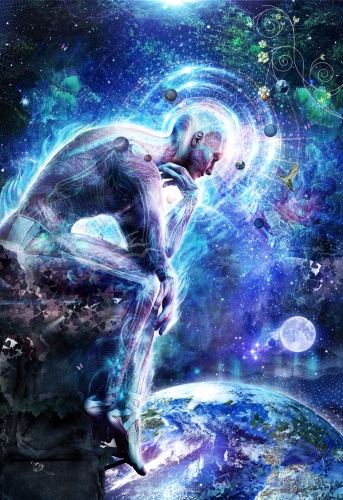
Ecology is the science concerned with the totality of man’s living space, his oikos, the Earth and nature. It is a natural science and therefore subservient to metaphysics; but, like other traditional sciences such as astronomy, geometry, and music, its study can offer a window into mind of God. Just as metaphysics is the science of cosmic order, and the Right is the party of socio-political order, integral ecology is the study of natural order. It strives for knowledge of natural law and, when honestly assessed, lends itself more to the political Right. Practically, it also gives support to the preservation of wild nature against thoughtless exploitation and destruction. The reasons for this are partly aesthetic, partly prudential, partly to preserve a spiritual haven from civilization, but most importantly because wild nature uniquely represents the handiwork of God, affected by but not wholly determined by the human will. While mankind is fallen in some sense from its original state of nobility, nature remains uncorrupted and is a mirror of transcendent reality. Man’s highest calling is to act not as conqueror and destroyer but rather as steward and contemplator.
One objection to this formulation might be that ecology — understood in its secondary sense as concern with the degradation of the natural environment — only appears in few, if any, expositions of traditional metaphysics or theorists of the Right. Love of wilderness and desire for its preservation is merely a sentimental invention of nineteenth-century Romantics and their utopian heirs of the 1960s. However, this is taking a limited view of the matter.
First of all, while the articulated love for landscape and scenery on a broad scale is a nineteenth-century phenomenon, it certainly has precursors in the ancient and medieval epics and poems, and it is difficult to imagine that men of past ages were immune to the sublime and beautiful. One need only read Homer, Virgil, Anglo-Saxon poets, and Dante to find natural metaphors and descriptions to rival anything written by the British Romantics. The game preserves of European royalty likely served for more than mere recreation, and were probably set aside as a haven for aesthetic and spiritual contemplation. Moreover, in previous ages, men would retire to the wilderness in order to draw closer to God; it was already known to be a place where one could encounter primordial reality more directly. Civilization is prone to distraction, impiety, and decadence, and requires the frequent experience of natural harshness to temper it. Men of old feared the wilderness more, certainly, but that was to their credit. It is our lack of fear and respect that has made us more arrogant and deluded than any previous age.
Secondly, while it is true that an overt opposition to the destruction of the natural environment did not occur until the nineteenth century, this is simply because such protest was not necessary before then. While humans have affected their environment on a fairly massive scale in previous ages, nothing could compare in scope and frequency to the unceasing world-wide ravages of industrialism. And the earliest defenders of wild nature against its degradation were, more often than not, Men of the Right [8] — aristocrats, poets, and anti-modernists who were suspicious of progress and industrialism and wanted to preserve wilderness as a bastion of noble and spiritual values in an increasingly vulgar age.
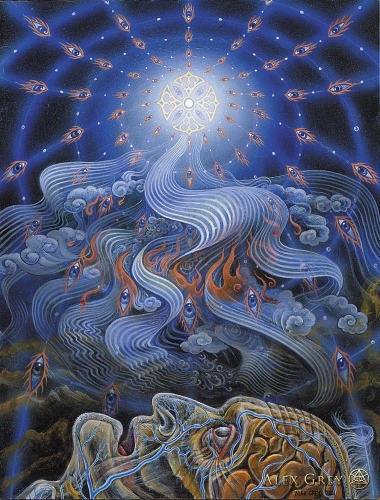
As I’ve stated elsewhere [9], it would be an exaggeration to claim that all of these thinkers and doctrines previously discussed were proto-ecological or, for that matter, even remotely concerned with the preservation of wild nature. This is partly because, until the time of the Industrial Revolution, it simply was not a widespread issue. We don’t know what we have until it’s gone.
The Anti-Tradition and its Contemporary Manifestations
Having thus established the relationship between traditional metaphysics, the political Right, and integral ecology, it would be helpful to make some brief remarks concerning their opposites. These are ascendant in the modern era, a marker of the decadence and impiety of the age.
There is an alternative or negative metaphysics, an “anti-tradition,” that denies the existence of a higher order and instead consists of nihilism, subjectivity, nominalism, materialism, and anthropocentrism. It seeks to dethrone the transcendent realm and make man the measure of all things. It did this, first, by transforming God into a distant watchmaker and making the law of nature synonymous with Enlightenment notions of progress and morality. Later, it denied God altogether and made mankind itself the lord of creation, capable of breaking all the bounds of nature and creating a perfect world. This is, for all intents and purposes, the theology of Satan (the first Leftist), and the perennial opponent of all true metaphysics. As it teaches that man can escape the bounds and requirements of the higher order and live according to his own will — remaking himself into a god — it tends ultimately to a rejection of all traditional restraints on human behavior. Its end result is a celebration of anarchy and license, hence its association with the political Left.
In its approach to science, and ecology in particular, this anti-tradition maintains that humankind is somehow exempt from nature and free to make its own reality (progressivism), or denies the existence of any reality or nature independent of human subjectivity (postmodernist constructivism). Its “environmentalism” is unmoored from any proper metaphysical grounding and is therefore merely subversive. Environmental critiques are more often than not simply weapons with which to attack the patriarchal capitalist order, much as the Leftist typically only uses science as a tool to bludgeon traditional religious doctrines. Its condemnations of consumption and materialism are merely incitements to Marxist revolution by other means, and its advocates reject “the received wilderness idea [10]” as an elitist concept. Even when it claims to support the preservation of wild nature, its primary concern is to bend nature to serve human needs (both material and ideological) and it is ultimately more interested in an illusory notion of “environmental justice” than with the preservation of natural order or beauty.
It doesn’t take much thought to see that this anti-tradition rests upon several false and contradictory ideas. For one, the notion of blind chance, random evolution, and all the atheistic materialism that passes for objective science in the contemporary academy in reality simply masks a number of undefended metaphysical assumptions. The modern dogma that the cosmos is merely a maelstrom of gyrating stupidity is by no means self-evident, has never been proven, and was not accepted throughout the vast majority of human existence. This is to say nothing of the practical effects of the anti-tradition, which has been adopted by the political Left and used to promote a false view of the natural world. For one, the subjectivity and utter nihilism at the core of the anti-tradition does not in any way support the Left’s supposed dedication to liberty and equality. It has become clear over the last five hundred years that, whatever their useful idiots believe, the occult forces in charge of the Left do not give a damn about ending poverty or oppression, “saving the planet,” improving the lot of the working class, or securing world peace. Nor could they, because their fundamental relativism renders every principle nothing more than a personal preference; hence the Left’s willingness to contain deeply contradictory interest groups (fundamentalist Muslims, radical feminists) beneath its umbrella due to their shared dedication to destroying traditional European civilization.
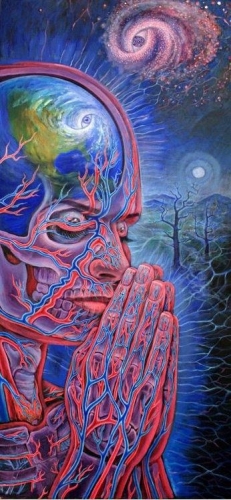
It has further become clear over the last five hundred years that the Left is an insatiable beast that is made stronger by every concession. Hence society has moved continually leftward, becoming ever-more nihilistic and permissive, removing every traditional restraint on human behavior, to the point that we are now seeing degeneracy unheard of since late imperial Rome and the Weimar Republic. The true goal of the Left is the destruction of traditional society and the “liberation” of people from its bonds. Once transformed into atomistic and hedonistic consumers, these deracinated subjects can be easily managed by the enlightened bureaucrats who constitute the true Leftist leadership.
Likewise, the supposed monopoly of the Left on environmental preservation is also undermined by its anti-traditional metaphysics. For if we do not admit an objective value to nature, if our interest in preserving it is merely due to subjective personal preferences, how can we defend it against seemingly more pressing demands for more housing, more suburbs, more jobs, higher standards of living, and so forth, which will only increase pressure on our few remaining wild spaces? Thus Leftist environmentalism always devolves into humanitarianism, which it calls “environmental justice.” Their rejection of any notion of natural order, or of the transcendent altogether, certainly does not lend itself to the preservation of wild nature. By simultaneously reducing human existence to the purely material and elevating mankind to the unchallenged tyrant of the universe, the modern anti-tradition has effectively removed any traditional restraints on human behavior. It is therefore no surprise that the worst environmental degradation has taken place in the modern period.
To conclude, the Man of the Right strives for a holistic understanding of the cosmos and his place in it, as opposed to the contradictory, opportunistic, and random commitments of his merely insurrectionist opposites. While the political situation appears to be growing worse by the day, we should never allow ourselves to be conquered by the spirit of the age.
If you want to support our work, please send us a donation by going to our Entropy page [11] and selecting “send paid chat.” Entropy allows you to donate any amount from $3 and up. All comments will be read and discussed in the next episode of Counter-Currents Radio, which airs every Friday.
Don’t forget to sign up [12] for the twice-monthly email Counter-Currents Newsletter for exclusive content, offers, and news.
Notes
[1] [13] This is also, I should note, the name given to Catholic teachings on the environment detailed in Pope Francis’ encyclical Laudato Si’ [14]. To a certain extent, this is appropriate, since (as I posit in this essay) Catholic Christianity is the vessel of traditional knowledge in the Western world. However, in its exposition by Pope Francis and his commentators, integral ecology overemphasizes the human dimension of the equation, essentially subordinating ecological to human welfare. This is typical of the contemporary Church but at variance with historical Roman Catholicism, for which many things — the salvation of souls, the maintenance of social order, justified violence in defense of the innocent — were more important than the mere preservation of human life.
[2] [15] I am well aware that many readers find Christianity objectionable, and to them I will say that a similar outlook might be found in classical Neoplatonism, as well as some schools of Hinduism, Buddhism, and Taoism. The indigenous European religions are defunct and scattered beyond any chance of complete reconstruction, while the Eastern religions are quite foreign to us and have no real harbor in a European soul shaped by two millennia of Christianity. Nevertheless, for those who wish to undertake the challenge of this reconstruction, the central themes of this essay still apply.
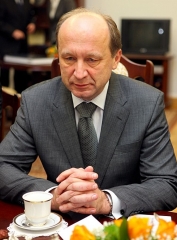 D'ailleurs, Andrius Kubilius (photo), l'ancien Premier ministre lituanien (pays, qui soutient ouvertement la révolution biélorusse) est l'un des auteurs de la résolution. Justification de l'importance de cette résolution selon ses termes :
D'ailleurs, Andrius Kubilius (photo), l'ancien Premier ministre lituanien (pays, qui soutient ouvertement la révolution biélorusse) est l'un des auteurs de la résolution. Justification de l'importance de cette résolution selon ses termes :



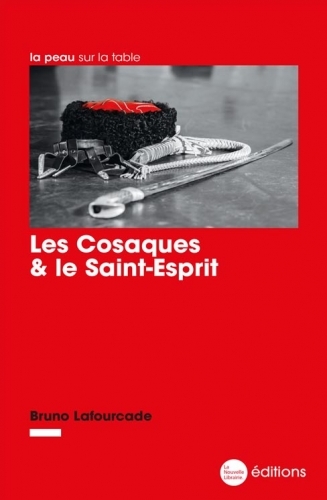 Bruno Lafourcade a naguère publié un essai courageux Sur le suicide, une charge contre les Les Nouveaus Vertueux. Plenel, Fourest, Joffrin, etc. & tous leurs amis, un fort roman, L’Ivraie, qui retrace le parcours d’un ancien gauchiste devenu sur le tard professeur de français dans un lycée technique de la banlieue bordelaise. Il s’y montrait hilarant et désespéré, incorrect et plein d’humanité. Et styliste exigeant, car l’homme connaît la syntaxe et la ponctuation, classiques à souhait. Qu’il fasse l’éloge du remords (« qui oblige ») ou du scrupule, de la modestie conservatrice face à l’arrogante confiance en soi du progressiste, du dédain face à la haine plébéienne (« on imagine mal tout le dédain que peut contenir un point-virgule »), Bruno Lafourcade se montre drôle et féroce, quasi masochiste à force de pointer avec tant de lucidité les horreurs de ce temps – un misanthrope doublé d’un moraliste, classique jusqu’au bout des ongles. Saluons ce polémiste inspiré, son allergie si salubre aux impostures de l’époque. Et cette charge contre telle crapule télévisuelle, minuscule écrivain qui, sur le tard, après vingt ans de courbettes, renie un confrère, son aîné, devenu pour la foule l’égal de Jack l’Eventreur.
Bruno Lafourcade a naguère publié un essai courageux Sur le suicide, une charge contre les Les Nouveaus Vertueux. Plenel, Fourest, Joffrin, etc. & tous leurs amis, un fort roman, L’Ivraie, qui retrace le parcours d’un ancien gauchiste devenu sur le tard professeur de français dans un lycée technique de la banlieue bordelaise. Il s’y montrait hilarant et désespéré, incorrect et plein d’humanité. Et styliste exigeant, car l’homme connaît la syntaxe et la ponctuation, classiques à souhait. Qu’il fasse l’éloge du remords (« qui oblige ») ou du scrupule, de la modestie conservatrice face à l’arrogante confiance en soi du progressiste, du dédain face à la haine plébéienne (« on imagine mal tout le dédain que peut contenir un point-virgule »), Bruno Lafourcade se montre drôle et féroce, quasi masochiste à force de pointer avec tant de lucidité les horreurs de ce temps – un misanthrope doublé d’un moraliste, classique jusqu’au bout des ongles. Saluons ce polémiste inspiré, son allergie si salubre aux impostures de l’époque. Et cette charge contre telle crapule télévisuelle, minuscule écrivain qui, sur le tard, après vingt ans de courbettes, renie un confrère, son aîné, devenu pour la foule l’égal de Jack l’Eventreur.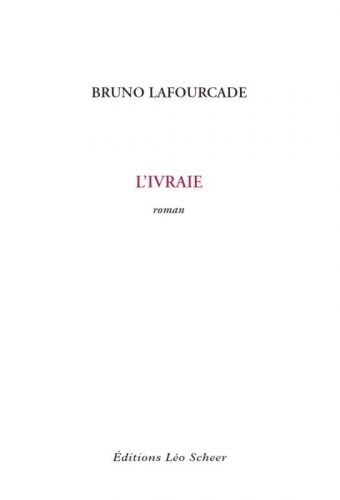 Encore un témoignage sur la misère des lycées techniques, se demandera le lecteur ? En fait, les choses sont bien plus complexes, grâce au talent, indiscutable, de Lafourcade, qui signe là un vrai livre d’écrivain, hilarant et désespéré, incorrect et plein d’humanité.
Encore un témoignage sur la misère des lycées techniques, se demandera le lecteur ? En fait, les choses sont bien plus complexes, grâce au talent, indiscutable, de Lafourcade, qui signe là un vrai livre d’écrivain, hilarant et désespéré, incorrect et plein d’humanité. 
 del.icio.us
del.icio.us
 Digg
Digg